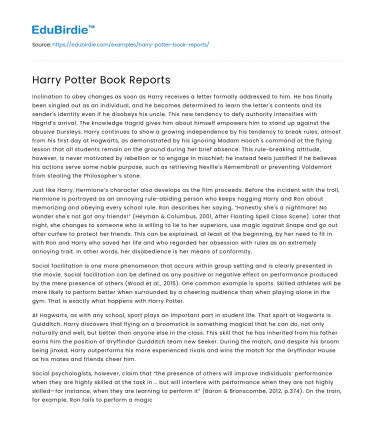Inclination to obey changes as soon as Harry receives a letter formally addressed to him. He has finally been singled out as an individual, and he becomes determined to learn the letter's contents and its sender's identity even if he disobeys his uncle. This new tendency to defy authority intensifies with Hagrid’s arrival. The knowledge Hagrid gives him about himself empowers him to stand up against the abusive Dursleys. Harry continues to show a growing independence by his tendency to break rules, almost from his first day at Hogwarts, as demonstrated by his ignoring Madam Hooch's command at the flying lesson that all students remain on the ground during her brief absence. This rule-breaking attitude, however, is never motivated by rebellion or to engage in mischief; he instead feels justified if he believes his actions serve some noble purpose, such as retrieving Neville's Remembrall or preventing Voldemort from stealing the Philosopher’s stone.
Just like Harry, Hermione’s character also develops as the film proceeds. Before the incident with the troll, Hermione is portrayed as an annoying rule-abiding person who keeps nagging Harry and Ron about memorizing and obeying every school rule. Ron describes her saying, “Honestly she's a nightmare! No wonder she's not got any friends!” (Heyman & Columbus, 2001, After Floating Spell Class Scene). Later that night, she changes to someone who is willing to lie to her superiors, use magic against Snape and go out after curfew to protect her friends. This can be explained, at least at the beginning, by her need to fit in with Ron and Harry who saved her life and who regarded her obsession with rules as an extremely annoying trait. In other words, her disobedience is her means of conformity.
Save your time!
We can take care of your essay
- Proper editing and formatting
- Free revision, title page, and bibliography
- Flexible prices and money-back guarantee
Social facilitation is one more phenomenon that occurs within group setting and is clearly presented in the movie. Social facilitation can be defined as any positive or negative effect on performance produced by the mere presence of others (Wood et al., 2015). One common example is sports. Skilled athletes will be more likely to perform better when surrounded by a cheering audience than when playing alone in the gym. That is exactly what happens with Harry Potter.
At Hogwarts, as with any school, sport plays an important part in student life. That sport at Hogwarts is Quidditch. Harry discovers that flying on a broomstick is something magical that he can do, not only naturally and well, but better than anyone else in the class. This skill that he has inherited from his father earns him the position of Gryffindor Quidditch team new Seeker. During the match, and despite his broom being jinxed, Harry outperforms his more experienced rivals and wins the match for the Gryffindor House as his mates and friends cheer him.
Social psychologists, however, claim that “the presence of others will improve individuals’ performance when they are highly skilled at the task in … but will interfere with performance when they are not highly skilled—for instance, when they are learning to perform it” (Baron & Branscombe, 2012, p.374). On the train, for example, Ron fails to perform a magic trick that his brother has taught him, and has probably at least done once at home, because his new classmates, Harry and Hermione are watching.
Prejudice and discrimination are another set of psychological concepts that are portrayed in the movie. Whereas prejudice describes the negative attitude towards others based on a number of factors (e.g. gender, religion, race etc.), discrimination is what happens when this attitude is translated into behaviour (Wood et al., 2015). This can be clearly demonstrated by the Dursleys' treatment of Harry, which Harry’s aunt explains the reason for when Hagrid visits on Harry’s birthday. After Harry’s mother received her Hogwarts letter, his aunt became convinced that Harry’s mother was a freak, and that the wizarding world and anything or anyone tied to it, is 'abnormal'. Instead of trying to learn more about her sister’s new magic world, she resolved to stay as far away from it as possible and her husband shared the same opinion. “I am not paying for some crackpot old fool to teach him magic tricks!” (Heyman & Columbus, 2001, Hagrid’s visit Scene). This biased view is a classic example showing how human ignorance and fear tend to go hand-in-hand. In a vicious circle, their ignorance causes them to be frightened by magic, while that fear prevents them from developing a better understanding of it. They have since brought out their bitter resentment and animosity onto Harry. The Dursleys' refusal to allow Harry to attend Hogwarts is clearly intended to deny him what they know he wants most. They want to keep him at home out of pure prejudice.
Obviously, Harry Potter has earned its reputation as a global phenomenon. Although its primary audience are children, the movie series has enough depth to appeal not only to teenagers and adults, but to social psychologists as well. From a psychological point of view, the movie clearly shows how our need to belong to or fit in can have a tremendous effect on the way we behave, how our success or failure can be influenced by the situations we find ourselves in and the people we interact with and finally how cruel our prejudices can make us be. The movie managed to change how obedience is regarded as a positive thing. Sometimes it is the ethical and more responsible choice to disobey as Harry has repeatedly shown us. Harry Potter will continue to educate, motivate and inspire viewers for decades to come.






 Stuck on your essay?
Stuck on your essay?

